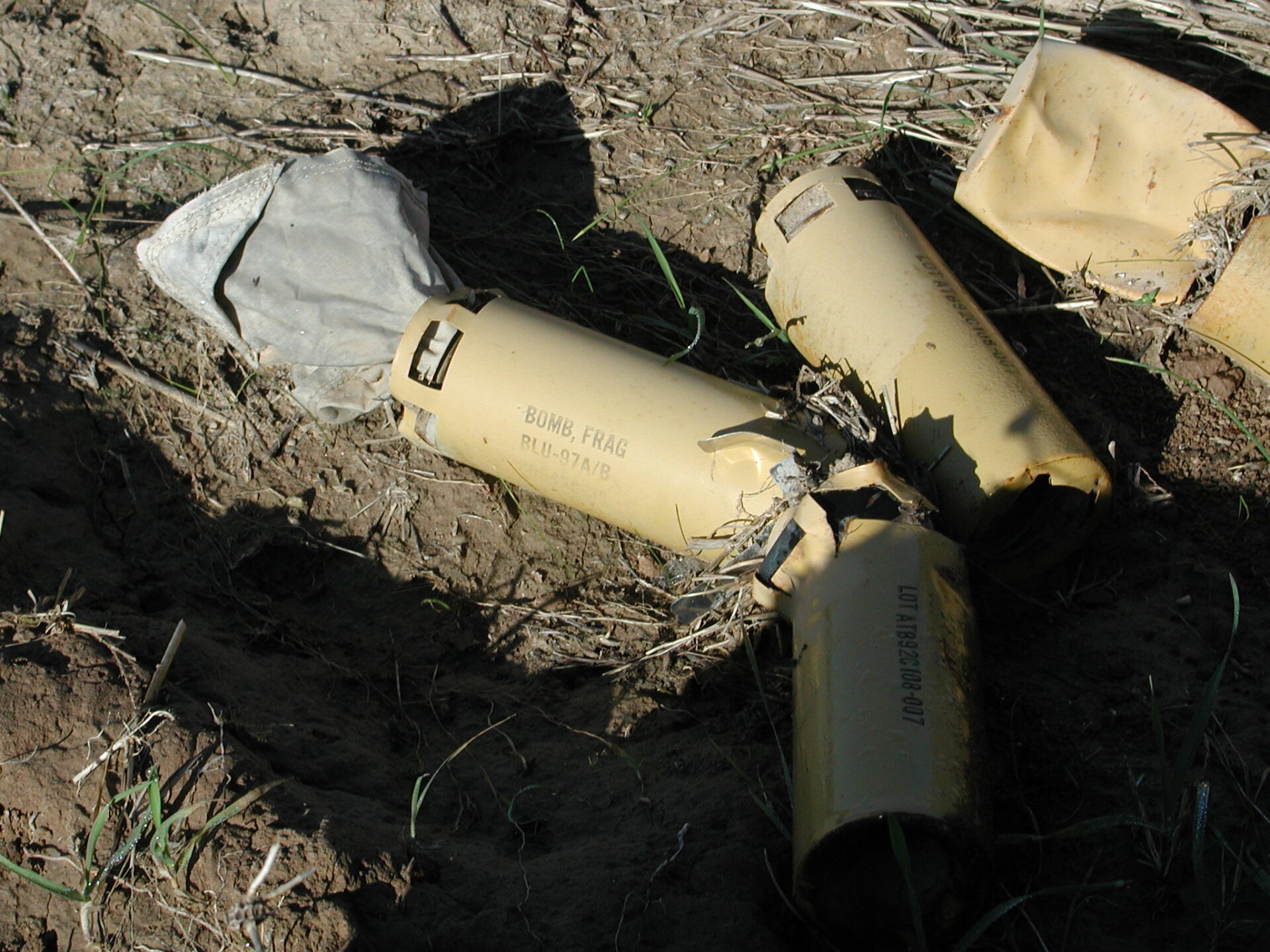In the aftermath of former President Jimmy Carter’s transition to hospice care, I was heartened to learn of his early support for the Mine Ban Treaty and the Convention on Cluster Munitions.
Landmines and cluster munitions have left a trail of human misery and death in almost every war zone around the world over the past 60 years. As these weapons now terrorize civilians and soldiers alike in Ukraine and still threaten life in over 50 countries, it is imperative that the United States use its leadership to ban these indiscriminate weapons.
Through years of Mennonite Central Committee work in Laos, and visits to Iraq and Lebanon to learn about the impact of unexploded ordnance in those countries, I repeatedly came face to face with people whose bodies and spirits were traumatized by my nation’s armaments. How do you respond to a tearful father whose children, ages 6 and 8, thought the US cluster bomb they had found while herding the family buffalo, was a toy?

CALLING FOR A BAN
In 1997, Carter called for the United States to join the Mine Ban Treaty as it was being negotiated via the Ottawa Process. Noting that landmines “are morally repugnant and no longer will be tolerated,” he also stated that the US ban on the export of anti-personnel landmines should be made permanent. In his acceptance speech for the Nobel Peace Prize in Oslo in 2002, Carter drew attention to the indiscriminate nature of landmines, noting that “We deny personal responsibility when we plant landmines and, days or years later, a stranger to us — often a child — is crippled or killed.”
Today, 25 years after the Mine Ban Treaty was signed, 164 nations are bound by the treaty’s obligations, with 94 nations reporting that they have destroyed their stockpile of anti-personnel landmines. Yet, the United States has not acceded to the Mine Ban Treaty, thereby failing to take a clear leadership role in stigmatizing these inhumane weapons. Current US policy prohibits the production and stockpiling of mines banned by the treaty and prohibits their transfer and use everywhere except in defense of South Korea. Why not accede to the treaty?
Current US policy permits its own use of cluster munitions that exceed the 1% failure rate. Given the trail of unexploded ordnance the United States has left behind after wars, this is deeply troubling.
In 1999, during the NATO bombing campaign in the Balkans, Carter called on the United States to stop its use of cluster munitions, stating that the United States’ insistence on the use of cluster bombs, which are “designed to kill or maim humans, is condemned almost universally and brings discredit on our nation (as does our refusal to support a ban on land mines).” Further, he specifically linked the use of cluster munitions to “the killing of hundreds of innocent civilians” and the destruction of hospitals.
Carter’s opposition to cluster munitions appears to have evolved over time. During his presidency, he determined that Israel’s use of US cluster munitions in Lebanon in 1978 had violated an end-use agreement from an earlier sale. In response, Carter imposed new restrictions, prohibiting Israel from using US cluster munitions “in or adjacent to areas of civilian populations.” Carter also canceled the sale of Fuel Air Explosive canisters to Israel due to their dreadful concussive effects and devastating impact on combatants, a sign of his growing opposition to indiscriminate weapons. His clear call to stop using cluster munitions came later, but still, nearly 10 years before the Convention on Cluster Munitions was signed.
As with the Mine Ban Treaty, the United States has not acceded to the Convention on Cluster Munitions. Current US policy, which was signed into law in 2009, prohibits the export of cluster munitions with a greater than 1% failure rate — a standard not applicable under the convention, which comprehensively bans the weapons.
Current US policy permits its own use of cluster munitions that exceed the 1% failure rate. Given the trail of unexploded ordnance (UXO) the United States has left behind after wars, this is deeply troubling. The UXO Sector Annual Report from Laos in 2021 notes that the United States dropped up to 270 million bomblets during its 9-year bombing campaign from 1964-1973, leaving tens of millions of unexploded submunitions behind. Researchers estimate that there have been 20,000 casualties from unexploded ordnance since the end of the war.
Today, humanitarian demining teams in Laos employ more than 4,000 people to find and destroy unexploded ordnance to improve safety and facilitate development. The Landmine and Cluster Munition Monitor reports that these teams destroyed more than 100,000 pieces of ordnance in 2019, with cluster munitions making up a high percentage of the total. The United States has contributed more than $300 million to this effort since 1995.

In a 2017 visit to Laos with Legacies of War, I visited with the Lee family, whose 10-year-old daughter had been killed by a US cluster munition a few weeks earlier. Traumatized by the experience, the family decided to move to a new plot of land. When clearance teams checked the area to ensure the family’s safety, they found 30 more cluster bombs. In Laos, in 2021, 11 were killed and 44 injured by unexploded ordnance. Globally, 149 new cluster munition casualties were recorded in 2021, killing 59 and leaving 90 injured.

During the Iraq War in 2003, the United States and the United Kingdom dropped nearly 13,000 cluster munitions, totaling 1.8-2 million submunitions. Researchers estimate that Iraqis have suffered between 5,500-8,000 casualties from cluster bomb strikes and unexploded ordnance from the time of the Gulf War until now.
Given this long and dismal track record, Carter’s opposition to landmines and cluster munitions is as relevant today as it was 25 years ago. Let’s honor Carter’s call, and rid the US arsenal of these indiscriminate weapons.





















